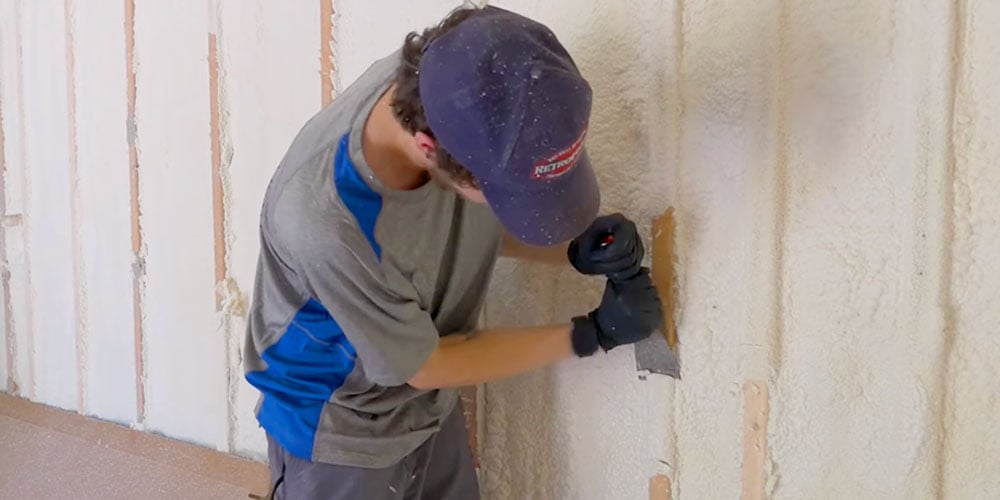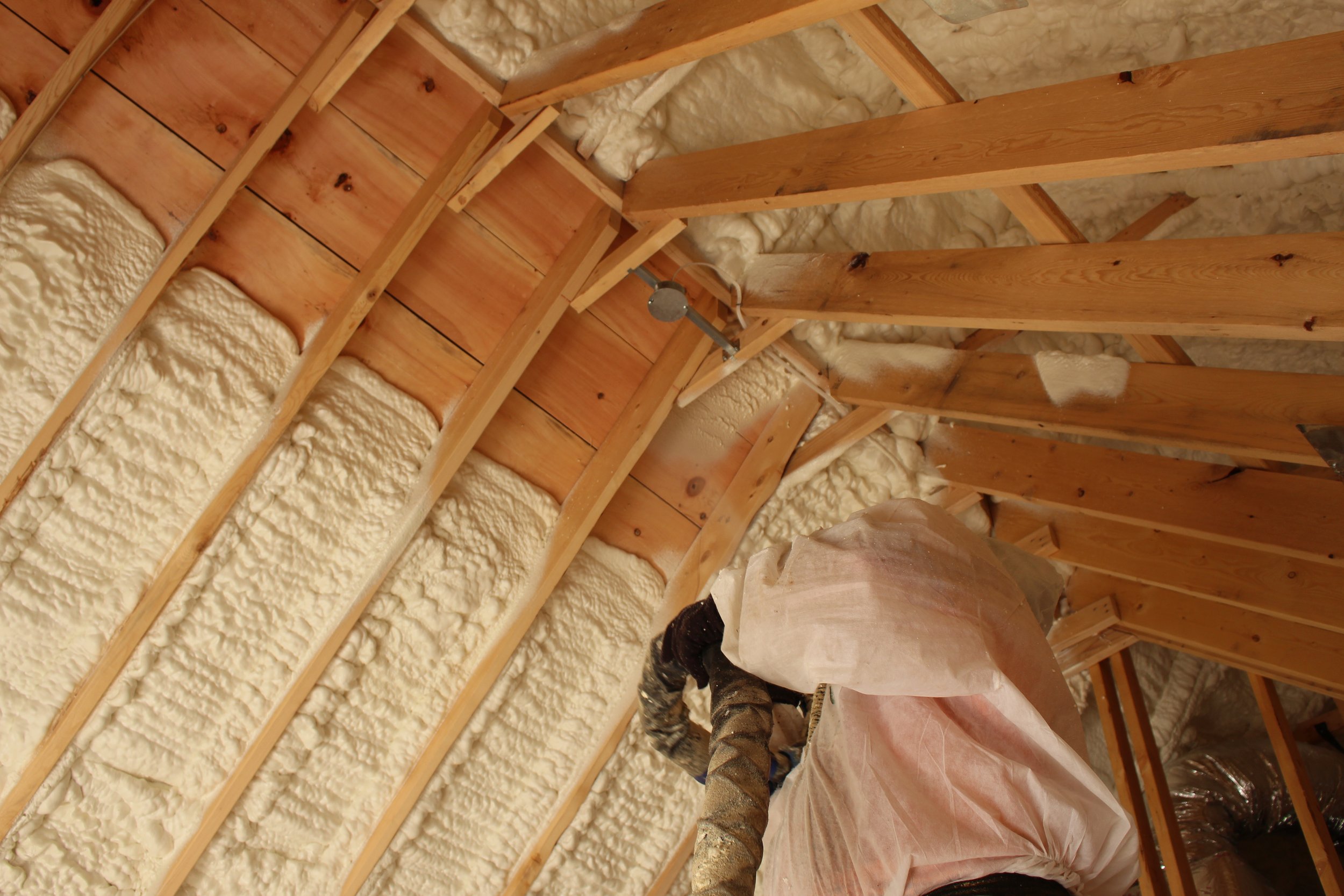Frequently Asked Questions About Spray Foam Installation and Usage
Frequently Asked Questions About Spray Foam Installation and Usage
Blog Article
Spray Foam: The Ultimate Service for Air Sealing and Insulation
Spray foam insulation has emerged as a leading option for reliable air sealing and thermal insulation, supplying an one-of-a-kind mix of properties that set it apart from conventional methods. Its capacity to broaden and fill up gaps makes it especially efficient in stopping air leakage, which can significantly affect power effectiveness. Nonetheless, understanding the full range of its benefits, installment procedures, and comparisons with other insulation types is vital for making educated choices. As we discover these aspects, the effects for both new constructions and retrofits become progressively considerable. What elements should affect your choice?
What Is Spray Foam?
Spray foam is a functional insulation material that incorporates the concepts of air securing and thermal resistance to improve energy effectiveness in buildings. Made up mainly of polyurethane or other similar compounds, spray foam is applied as a fluid that expands upon contact with surface areas, developing a solid, continuous layer of insulation. This unique home allows it to load gaps, splits, and voids that conventional insulation materials may overlook, providing a premium air seal.
There are two major sorts of spray foam: open-cell and closed-cell. Open-cell spray foam is lighter and more adaptable, offering exceptional audio absorption and a lower R-value per inch - Spray Foam. In comparison, closed-cell spray foam is denser, giving a greater R-value, dampness resistance, and included architectural honesty to developing parts
The application procedure typically entails specialized devices, ensuring a smooth application that complies with different substratums, including concrete, wood, and metal. This flexibility makes spray foam appropriate for both brand-new building and constructions and retrofitting existing structures. Its capacity to produce an impermeable barrier significantly contributes to minimizing power consumption and enhancing interior air top quality, therefore making it a preferred choice among house owners and building contractors alike.
Benefits of Spray Foam Insulation
One of the most considerable advantages of spray foam insulation is its outstanding capacity to produce a continuous air barrier, which properly decreases power loss. Unlike standard insulation products, spray foam increases to load voids and splits, guaranteeing that air leakage is drastically minimized. This particular not only improves power efficiency yet also results in reduce energy costs with time.
Furthermore, spray foam insulation offers exceptional thermal resistance, adding to a more secure interior environment. Its high R-value per inch permits reliable insulation in confined areas, making it ideal for attics, wall surfaces, and crawl areas. Additionally, the moisture-resistant properties of spray foam help protect against mold and mildew and mold development, advertising healthier living problems.
Another essential benefit of spray foam insulation is its sound-dampening high qualities (Spray Foam). It effectively reduces sound transmission between spaces, developing a quieter and extra comfy home atmosphere. The longevity of spray foam likewise stands apart, as it does not sag or resolve gradually, preserving its performance throughout its life-span
Exactly How Spray Foam Functions
Understanding just how spray foam insulation functions is essential for valuing its efficiency in air sealing and thermal resistance. Spray foam insulation contains two main elements: isocyanate and polyol material. When these components are combined, they undertake a chain reaction that causes the product to broaden quickly, creating a dense foam that fills up spaces, cavities, and fractures.
As the foam expands, it follows surface areas, creating a closed seal that dramatically decreases air seepage. This characteristic makes spray foam insulation very reliable at avoiding drafts and wetness infiltration, which can cause energy loss and damages gradually. Additionally, the closed-cell version of spray foam supplies remarkable thermal resistance as a result of its inflexible structure, effectively lessening heat transfer.
The unique homes of spray foam enable it to comply with irregular surfaces, guaranteeing extensive protection and a smooth barrier. Consequently, spray foam insulation not only boosts energy effectiveness yet also adds to boosted indoor air high quality by lowering the accumulation of toxins and irritants. Ultimately, comprehending the technicians behind spray foam underscores its role as a remarkable selection for insulation and air securing in both domestic and industrial applications.
Installment Refine Review

Before installation, the area has to be effectively cleansed and prepped, making sure that surface areas are totally free from wetness, particles, and dirt. This action is crucial because contaminants can compromise adhesion and overall performance. Once the area is prepared, the application involves mixing both components of the spray foam, which expands upon contact and fills up voids properly.
Educated specialists should carry out the setup, using customized devices to make sure consistent protection and optimum thickness. Safety and security precautions, including using safety equipment and guaranteeing appropriate air flow, are crucial during this process. After application, the foam usually cures swiftly, developing a solid barrier that enhances power effectiveness.
Comparing Spray Foam to Typical Insulation
When reviewing insulation choices, spray foam insulation stands apart in contrast to standard materials such as fiberglass and cellulose. Among the primary benefits of spray foam is its exceptional air securing abilities. Unlike fiberglass and cellulose, which can permit air infiltration, spray foam expands upon application, loading gaps and holes to produce an airtight seal. This leads to boosted energy performance, as much less heated or cooled down air leaves the home, bring about lower energy costs.
Additionally, spray foam supplies a greater R-value per inch than conventional insulation kinds, offering even more effective thermal resistance in a thinner profile. This particular is specifically useful precede with minimal dental caries deepness. Spray foam is resistant to wetness and mold and mildew development, which can be a substantial problem with cellulose and fiberglass, specifically in moist settings.
Nonetheless, spray foam insulation typically carries a higher upfront cost than its conventional counterparts. Property owners should evaluate this preliminary investment versus long-lasting energy cost savings and performance benefits. Ultimately, while both insulation types serve their function, spray foam arises as an advanced solution for modern insulation demands, specifically in regards to air sealing and thermal efficiency.

Final Thought
In recap, spray foam insulation stands for a highly efficient remedy for accomplishing optimum air securing and thermal resistance. Its special properties, consisting of dampness resistance and sound dampening, make it dig this appropriate for different applications in both brand-new constructions and retrofitting jobs (Spray Foam). The initial costs may be greater contrasted to typical insulation products, the lasting advantages, such as considerable energy cost savings and enhanced indoor air high quality, Look At This justify the investment and underscore its worth in modern-day structure methods.
Spray foam insulation has arised as a leading remedy for reliable air securing and thermal insulation, using a special mix of properties that establish it apart from traditional approaches.Spray foam is a functional insulation product that integrates the principles of air securing and thermal resistance to improve power effectiveness in buildings.When assessing insulation options, spray foam insulation stands out in contrast to typical products such as fiberglass and cellulose. Eventually, while both insulation kinds offer their function, spray foam emerges as an extra sophisticated solution for modern-day insulation requirements, particularly in terms of air securing and thermal efficiency.
In recap, spray foam insulation represents a very effective remedy for accomplishing ideal air sealing and thermal resistance.
Report this page